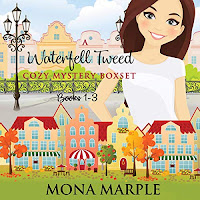 Waterfell Tweed Cozy Mystery Series: Books 1-3 by Mona Marple.
Waterfell Tweed Cozy Mystery Series: Books 1-3 by Mona Marple.My rating: 3 of 5 stars ⭐⭐⭐
Duration: 10 hrs 19 mins.
A Waterfell Tweed Cozy Mystery Series, Box Set 1: books 1-3 by Mona Marple is a charming mystery series set in a quaint little village bookshop/cafe called Books & Bakes. Owner Sandy Shaw becomes drawn into a series of murders, using her local knowledge to uncover the truth, much to the chagrin of the City detective who has been ushered in to crack the cases.
Waterfell Tweed itself is a rather twee village which feels as though it could be anywhere across Britain, as it doesn't have a very distinct regional personality. This makes it easier to imagine it being the 'local' country village with which each reader is familiar, but does make it a little more difficult to imagine the author's vision. I'm sure the location was described in the very beginning but I failed to make a mental (or physical) note of it, and consequently had no notion at all of its geographical location until the Peak District was mentioned in Book 2. Even the detective is referred to as being from The City. I found this anonymity quite distracting, especially given that the narrator has a slight Australian accent, and many of the characters’ names sounded as though they would suit Home and Away, too (Sandy, Cassie, Dory, Bernice, Elaine, etc). It all contributed to the sense of Waterfell Tweed lacking a little identity that might help anchor it to a tangible sense of place.
This series is best described as 'chick lit' though I do wish there was a better term for it. The mysteries are a little predictable but that goes with the territory when reading a cosy, and the books are all lightweight listening with sweet, clean, ‘girly’ themes and emotionally-driven plots. I haven't listened to many other books in the ‘women’s fiction/rom-com’ genre but once I got to know the characters I enjoyed it. I needed something that was very easy to listen to this week, and it was no chore at all to sit back and drift off into a little bookshop bakery.
These books feature several female characters from various generations, and initially I felt that I would have preferred the stories to have been from the perspective of one of the older women; perhaps Dory of the 'Black Widows Club'. But, regardless of age, the common thread linking all three books is that they are predominantly stories about women, perhaps even more so than they are mysteries. The investigations into the various deaths are just the mechanism by which we come to learn about how the women of the village really live. Sandy slowly comes to see that behind closed doors there are widows rebuilding their lives, sisters learning to be a family, mothers struggling to feed their kids, and wives battling their husbands' addictions. Once I understood that, the books grew on me with each subsequent title in the collection.
I would listen to other Waterfell Tweed collections like this one, as they are great for days when I need to rest and not invest my attention in anything too cognitively or emotionally draining, but still wish to be entertained.
I felt that the writing could have been a little tighter and less passive. It felt at times as though the narrator tripped up on a few of the more awkward phrases, and repetitive wording always feels clunky. (I think anyone would stumble when trying to say "twice-baked strawberry shortcake cheesecake" in the middle of a sentence!) However, it does also give the characters some realism when they have a few rough edges. Real people do repeat themselves or have 'favourite sayings' so perhaps it is a little pedantic to be annoyed with Sandy for frequently "sitting down as she tried to calm her breathing". I am terrible at regularly practicing the mindfulness which helps me rest effectively, so perhaps when I listen to future Waterfell Tweed collections I can turn Sandy's recurrent breathwork into a meditative prompt to centre my own!
There were two plot points that I found irksome, and the first involved Sandy's sister, Coral. Coral's previous career as a journalist is frequently referenced but never really utilised. She also appears to be the least curious person in the world, contentedly serving food at the cafe while her sister is out chasing down leads and trying to piece together mysteries. It's quite odd that Coral isn't joining Sandy to talk to people or helping her to untangle events and search for answers. In fact, Coral is exactly the sort of person who would normally have been the protagonist of this kind of story. It could be argued that it's refreshing to turn that on its head, but if Coral's journalistic background isn't going to be used constructively then I think it would have made more sense to give her a different career history. Something administrative and task-oriented, or people-based that would explain why she finds it fulfilling to bustle around the cafe serving customers and gossiping with them without deliberately fishing for information. It means that Coral's character often feels like a 'means to an end' who frees Sandy up to leave the shop and pursue her mysteries, rather than a character who earns her role in the story. (For contrast, consider Sarah's assistant, Grace, who fulfils the same role in the Cherringham mystery series. Grace's character is more rounded, and though she is kept on the fringes of most storylines it is explained as a desire to shield her from the consequences of the investigations. When her skills might be useful, however, she has always been keen to help.)
My second gripe was with Sandy's love-interest. Their acquaintance started out well and looked like it was going to be a nice, slow burn with a few bumps in a road which would ultimately bring them together. But it all felt a bit unbelievable when Sandy suddenly declared her love for someone she wasn't sure if she had actually even been dating. It didn't feel out of place when 15-year-old Olivia became besotted by her boyfriend just as swiftly, but in an older, more independent woman it was disappointing. Sandy is described as 'homely' early on in the series, with the man whose eye she catches perceived as the village 'hunk', so for her to fall almost instantly in love with him just feels a bit... Predictable? Cheap? I was rooting for them as a couple up until that point, but it felt like it came out of nowhere and made Sandy seem like a bit of a drip. Instead of feeling romantic it seemed rushed to give the collection a Happy Ever After.
There were a few niggling inconsistencies in the books, which was only noticeable because they were packaged into a trilogy which I listened to back-to-back. In Book 1, Olivia is introduced as Cass' half-sister as they share a father, but in Book 2 Olivia is referred to as her step-sister. Also, Sandy claims that after the fight outside Gus' Butcher's shop, is the first time Derek - who usually calls her "lady" - has used her name. The first instance is actually in the previous book when she was giving him a lift back to the village.
Both these inconsistencies are easily missed when changing details, timelines, and backstories as a manuscript evolves, but they do tend to jar me out of a story if they sneak their way into the finished product. If a reader or listener is to really invest in a character or fictional world then it is important to be true to their history.
A lovely touch to these books is the inclusion of several recipes. Some are part of the main story, and others are included at the end. The stand-out bake for me, which embodied the sweet, comforting, feel of the series was Sandy's Honey Cake. I have asked the author if I can include a link to it, or reproduce it for you here, and will update this post if I hear back. Until then, I would recommend baking this simple Honey Cake Recipe from James Martin’s collection for BBC Food as the best accompaniment while listening to the series.
The narrator, Nano Nagle, has a pleasant and expressive voice which brought each of the characters to life very nicely. She handled the broad age-ranges well, and all her characters had personality. I found her delivery a little languid so sped up the audiobook to 1.10x playback speed, which made it flow better to my ear. This is always personal preference, however, and I know many people who usually slow down narration, for whom Nano Nagle's performance would be perfectly suited just as it is.
Overall, I feel that this collection of novellas would be the perfect lightweight summer holiday listening for anyone who enjoys cosy mysteries and village bake-sales. They may be good fun for people who like M C Beaton's Agatha Raisin series, though they are rather different in tone, and for anyone who enjoys stories about a community of women. (Though my favourite pick in that particular genre is
Erotic Stories for Punjabi Widows
.)
*I received this audiobook free of charge in exchange for an honest, unbiased review.
(Click here to buy this book, listen to a sample, or add it to your wishlist!)












No comments